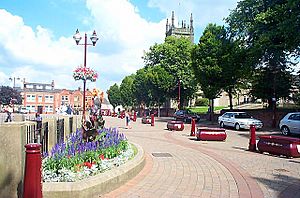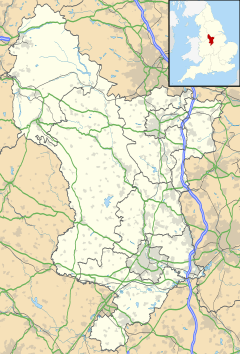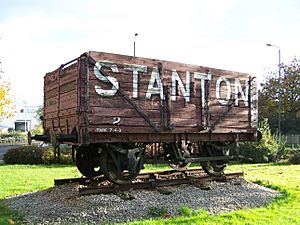Ilkeston facts for kids
Quick facts for kids Ilkeston |
|
|---|---|
 Ilkeston Market Place (August 2003) |
|
| Population | 40,953 (2021) |
| Demonym | Ilkestonian |
| OS grid reference | SK 46399 41774 |
| District |
|
| Shire county | |
| Region | |
| Country | England |
| Sovereign state | United Kingdom |
| Post town | ILKESTON |
| Postcode district | DE7 |
| Dialling code | 0115 |
| Police | Derbyshire |
| Fire | Derbyshire |
| Ambulance | East Midlands |
| EU Parliament | East Midlands |
| UK Parliament |
|
Ilkeston (![]() i/ˈɪlkəstən/ ill-KIS-tun) is a town in Derbyshire, England. It is part of the Borough of Erewash. In 2021, about 40,953 people lived there.
i/ˈɪlkəstən/ ill-KIS-tun) is a town in Derbyshire, England. It is part of the Borough of Erewash. In 2021, about 40,953 people lived there.
Ilkeston is located between the cities of Derby and Nottingham. It is also close to the M1 motorway and the River Erewash. Long ago, Ilkeston was known for coal mining, iron working, and making lace and other textiles. Most of these industries have now disappeared.
Contents
Discovering Ilkeston's Past
Ilkeston was probably started around the 6th century. Its name might come from an Anglian chieftain named Elch or Elcha. The town is mentioned in the Domesday Book of 1086 as Tilchestune. At that time, it was mainly owned by Gilbert de Ghent. Queen Victoria made Ilkeston a borough in 1887.
Ilkeston's Unique Dialect
People in Ilkeston often speak a special dialect of East Midlands English. In this dialect, Ilkeston is sometimes called 'Ilson'. The name is usually said with three syllables: Il-kis-tun.
Fun Parks and Quirky News
The American Adventure was a big theme park near Ilkeston. It closed in 2007. It was located next to Shipley Country Park.
The NatWest bank in Ilkeston got a lot of attention. A hole in a nearby wall received many funny reviews on Tripadvisor. This caused the bank to stop new reviews in February 2020.
The Story of Stanton Ironworks
One of the most important local businesses was the Stanton Ironworks. It was later known as Stanton and Staveley. People had been working with iron in this area since Roman times. The iron industry grew very big in the 1780s.
By the mid-1800s, the works had several large furnaces. They produced huge amounts of iron. Later, they also started making steel and concrete pipes. Stanton was the first in the UK to make 'spun pipes'.
At its peak, up to 12,500 people worked for the company. About 7,000 of them were at the Stanton works. The company made many things, including pig iron, tunnel parts for the London Underground, and pipes. They also made street furniture, chemicals, and parts for weapons.
The works slowly closed down. The last iron casting happened in 2007. Parts of the huge Stanton site are now used for a business park. Other parts are planned for new developments.
Ilkeston's Famous Charter Fair
Ilkeston Market Place hosts a special Charter fair. This fair is very old! It celebrated its 772nd anniversary in 2024. King Henry III granted the town permission for the fair in 1252. This means Ilkeston's fair is even older than Nottingham's famous Goose Fair. It is one of the biggest street fairs in the country, and even in Europe.
The fair we see today grew from two older fairs. One was the original Charter Fair, held in August. The other was an 'agricultural hiring fair' in October. In 1888, these two fairs were combined. Since then, the Charter Fair has been held every October.
Since 1931, the Mayor officially opens the fair. This happens on Fair Thursday at noon. The Town Clerk reads the original Charter from the steps of the Town Hall.
Ilkeston's Historic Spa Baths
In the early 1800s, people found natural mineral waters in Ilkeston. A local businessman, Thomas Potter, built the famous Ilkeston Bath in 1831. It was next to the Rutland Hotel. For over 60 years, these baths brought visitors to the town. This was a time when spa towns like Bath were very popular.
A well-known saying was: "If you're doubled in pain and thin as a lath, Come at once then and try, the famed Ilkeston Bath." However, spa bathing became less popular. Also, mining activities might have polluted the water. The baths closed just before 1900. The baths and the hotel are no longer there. But 'Bath Street' still reminds us of them.
Getting Around Ilkeston
Ilkeston's Railway Connections
For many years, Ilkeston did not have a railway station. This was surprising for a town of its size. The Erewash Valley Line runs along the eastern edge of the town.
Ilkeston once had three railway stations!
- Ilkeston Junction station closed in 1967.
- Ilkeston Town station closed to passengers in 1947.
- Ilkeston North closed in 1964.
A famous part of the line near Ilkeston North was Bennerley Viaduct. This is a 1,452-foot (443 m) long, 61-foot (19 m) high iron bridge. It still crosses the Erewash valley. It was once going to be pulled down, but now it's a protected building. The viaduct has been reopened as a path for walking and cycling.
After a long campaign by local people, a new station was built. It was announced in 2013 as part of the 'New Stations Fund'. The new Ilkeston station opened on April 2, 2017. It has two platforms, a 150-space car park, and places for bikes.
Bus Services in Ilkeston
Trentbarton runs most of the buses in Ilkeston. These include the Ilkeston Flyer to Derby, My15 to Long Eaton and East Midlands Airport, and The Two to Nottingham. Other companies like Notts + Derby and Littles Travel also run some routes.
Sports and Activities in Ilkeston
Football Fun
- The original Ilkeston Town football club closed in 2010.
- Ilkeston FC was formed in 2011 but also closed in 2017.
- A new club, Ilkeston Town F.C., was started in July 2017. It plays at the New Manor Ground.
Rugby Action
- Ilkeston Rugby Club, known as the "Elks," started in 1926. Their home ground is at 'The Stute'.
Cricket Matches
- Ilkeston Rutland Cricket Club began in 1829. It is based at Rutland Sports Park. The club has four senior teams and a strong junior section.
- From 1925 to 1994, Derbyshire County Cricket Club played many matches at the Rutland Recreation Ground.
Tennis Courts
- Ilkeston Tennis Club is at Rutland Sports Park. It is said to be the biggest tennis club in Ilkeston. It has 4 outdoor and 3 indoor courts.
- Stanton Tennis Club is a private club at The Stute Hallam Fields Road. It has 3 private tennis courts.
Basketball Teams
- Ilkeston Outlaws Basketball Club started in 1966. They have teams in local and national leagues.
- The Ilkeston Outlaws also have two junior teams: the Ilkeston Hawks and Ilkeston Falcons. These are for players aged 4–18 years.
Golf Courses
- Ilkeston Borough Golf Club was founded in 1929. It had a 9-hole golf course called 'Pewit Golf Course'. The course closed in 2022. It is now a nature reserve.
Media and News
Local news and TV programmes come from BBC East Midlands and ITV Central.
You can listen to local radio stations like BBC Radio Nottingham (103.8 FM) and BBC Radio Derby (104.5 FM). Other stations include Smooth East Midlands (106.6 FM), Capital East Midlands (96.2 FM), Greatest Hits Radio Midlands (106.6 FM), and Erewash Sound (96.8 FM).
The town has two local newspapers: the Ilkeston Advertiser and Ilkeston Life.
Ilkeston's Twin Town
Ilkeston is twinned with:
 Châlons-en-Champagne in France. They became twin towns in 1957.
Châlons-en-Champagne in France. They became twin towns in 1957.
Famous People from Ilkeston
- Samuel Taylor (1816–1875) was known as the 'Ilson Giant'. He was 7 feet 4 inches tall! His grave was restored in 2008.
- Stanley Hawley (1867-1916) was a pianist and composer. He was born in Ilkeston.
- William Roache grew up in Ilkeston. He plays Ken Barlow in Coronation Street. He holds a world record for playing the same role for the longest time.
- Robert Lindsay is a stage and TV actor. He was born in Ilkeston in 1949. He worked at the Stanton & Staveley steel works before becoming an actor.
- Linda Armstrong is an actress born in Ilkeston.
- Robert Holmes (born 1943) is a photographer, author, and adventurer.
- John Paxton (1819–1868) was a cricketer.
- Ben Roberts played Chief Inspector Derek Conway in ITV's The Bill.
- Alf Freeman (1904-1966) was a football player.
Images for kids
See also
 In Spanish: Ilkeston para niños
In Spanish: Ilkeston para niños
 | Sharif Bey |
 | Hale Woodruff |
 | Richmond Barthé |
 | Purvis Young |















